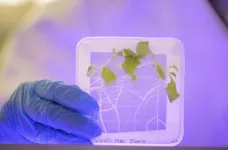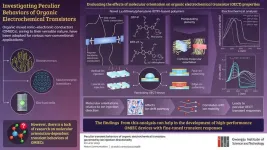(Press-News.org) Lettuce and other leafy green vegetables are part of a healthy, balanced diet — even for astronauts on a mission.
It’s been more than three years since the National Aeronautics and Space Administration made space-grown lettuce an item on the menu for astronauts aboard the International Space Station. Alongside their space diet staples of flour tortillas and powdered coffee, astronauts can munch on a salad, grown from control chambers aboard the ISS that account for the ideal temperature, amount of water and light that plants need to mature.
But there is a problem. The International Space Station has a lot of pathogenic bacteria and fungi. Many of these disease-causing microbes at the ISS are very aggressive and can easily colonize the tissue of lettuce and other plants. Once people eat lettuce that’s been overrun by E. coli or Salmonella, they can get sick.
With billions of dollars poured into space exploration each year by NASA and private companies like SpaceX, some researchers are concerned that a foodborne illness outbreak aboard the International Space Station could derail a mission.
In new research published in Scientific Reports and in npj Microgravity, University of Delaware researchers grew lettuce under conditions that imitated the weightless environment aboard the International Space Station. Plants are masters of sensing gravity, and they use roots to find it. The plants grown at UD were exposed to simulated microgravity by rotation. The researchers found those plants under the manufactured microgravity were actually more prone to infections from a human pathogen, Salmonella.
Stomata, the tiny pores in leaves and stems that plants use to breathe, normally close to defend a plant when it senses a stressor, like bacteria, nearby, said Noah Totsline, an alumnus of UD’s Department of Plant and Soil Sciences who finished his graduate program in December. When the researchers added bacteria to lettuce under their microgravity simulation, they found the leafy greens opened their stomata wide instead of closing them.
“The fact that they were remaining open when we were presenting them with what would appear to be a stress was really unexpected,” Totsline said.
Totsline, the lead author of both papers, worked with plant biology professor Harsh Bais as well as microbial food safety professor Kali Kniel and Chandran Sabanayagam of the Delaware Biotechnology Institute. The research team used a device called a clinostat to rotate plants at the speed of a rotisserie chicken on a spinner.
“In effect, the plant would not know which way was up or down,” Totsline said. “We were kind of confusing their response to gravity.”
It wasn’t true microgravity, Totsline said, but it did the job to help plants lose their sense of directionality. Ultimately, the researchers discovered that it appears Salmonella can invade leaf tissue more easily under simulated microgravity conditions than it can under typical conditions on Earth.
Additionally, Bais and other UD researchers have shown the usage of a helper bacteria called B. subtilis UD1022 in promoting plant growth and fitness against pathogens or other stressors such as drought.
They added the UD1022 to the microgravity simulation that on Earth can protect plants against Salmonella, thinking it might help the plants fend off Salmonella in microgravity.
Instead, they found the bacterium actually failed to protect plants in space-like conditions, which could stem from the bacteria’s inability to trigger a biochemical response that would force a plant to close its stomata.
“The failure of UD1022 to close stomata under simulated microgravity is both surprising and interesting and opens another can of worms,” Bais said. “I suspect the ability of UD1022 to negate the stomata closure under microgravity simulation may overwhelm the plant and make the plant and UD1022 unable to communicate with each other, helping Salmonella invade a plant.”
Foodborne pathogens aboard the International Space Station
Microbes are everywhere. These germs are on us, on animals, on the food we eat and in the environment.
So naturally, UD microbial food safety professor Kali Kniel said that wherever humans are, there is a potential for bacterial pathogens to coexist.
According to NASA, around seven people at a time live and work on the International Space Station.
It’s not the tightest environment — about as big as a six-bedroom house — but it’s still the kind of place where germs can wreak havoc.
“We need to be prepared for and reduce risks in space for those living now on the International Space Station and for those who might live there in the future,” Kniel said. “It is important to better understand how bacterial pathogens react to microgravity in order to develop appropriate mitigation strategies.”
Kniel and Bais have a long history of bringing their subject areas of microbial food safety and plant biology together to study human pathogens on plants.
“To best develop ways to reduce risks associated with the contamination of leafy greens and other produce commodities we need to better understand the interactions between human pathogens on plants grown in space,” Kniel said. “And the best way to do this is with a multidisciplinary approach.”
A growing population on Earth, a greater need for safe food in space
It may be a while before humans can live on the moon or Mars, but the UD research has some big potential impacts for cohabiting outer space.
According to a United Nations report, the Earth could be home to 9.7 billion people in 2050 and 10.4 billion people in 2100.
On top of that, Bais, the UD plant biology professor, said food safety and food security measures are already at their peak across the world. With the loss of agricultural land over time to grow food, “people are going to soon think seriously about alternate habitation spaces,” he said. “These are not fiction anymore.”
And seemingly more often, the Centers for Disease Control and Prevention or the U.S. Food and Drug Administration will issue a recall on certain lettuce on Earth, telling people not to eat it because of a risk of E. coli or Salmonella.
With leafy greens being the food of choice for many astronauts and easy to grow in indoor environments such as a hydroponic environment in the International Space Station, Bais said it’s important to make sure those greens are always safe to eat.
“You don’t want the whole mission to fail just because of a food safety outbreak,” Bais said.
Solutions: sterilized seeds and improved genetics
So, if plants are opening their stomata wider in a microgravity environment and allowing bacteria to easily get in, what can be done?
It turns out, the answer isn’t that simple.
“Starting with sterilized seeds is a way to reduce risks of having microbes on plants,” Kniel said. “But then microbes may be in the space environment and can get onto plants that way.”
Bais said scientists may need to tweak plants’ genetics to prevent them from opening their stomata wider in space. His lab is already taking different lettuce varieties that have different genetics and evaluating them under simulated microgravity.
“If, for example, we find one that closes their stomata compared to another we have already tested that opens their stomata, then we can try to compare the genetics of these two different cultivars,” Bais said. “That will give us a lot of questions in terms of what is changing.”
Any answers they find could help prevent future problems with rocket salad.
The research, Simulated microgravity facilitates stomatal ingression by Salmonella in lettuce and suppresses a biocontrol agent, and Microgravity and evasion of plant innate immunity by human bacterial pathogens was funded by NASA-EPSCoR.
END
Salad in space? New study says it's not a healthy choice
Research team finds lettuce and other plants are more susceptible to bacterial infections in space than on Earth
2024-01-22
ELSE PRESS RELEASES FROM THIS DATE:
Sexual minority young people in Canada more likely to experience harmful police contact
2024-01-22
Toronto, ON – While there has been much public scrutiny and research on police interactions and violence towards sexual minorities in the United States, there is a gap in the current literature on how sexual minorities fare with law enforcement contact in Canada. A new study published in the Annals of Epidemiology aims to fill this research gap by examining the relationship between sexual orientation and experiences with police contact, including intrusion and harassment from the police, in Canada.
Among a sample of 940 adolescents and young adults across Canada, the study found that the prevalence of police contact was highest among persons ...
University Hospitals OBGYN and urologist Joseph Welles Henderson, MD, named InterStim™ Center of Excellence
2024-01-22
CLEVELAND -- Joseph Welles Henderson, MD, of University Hospitals has been named an InterStim™ Center of Excellence by Medtronic (NYSE: MDT), the world’s largest medical device manufacturer. The designation is awarded to caregivers who have demonstrated particular expertise in the use of the InterStim™ system to treat overactive bladder, as well as non-obstructive urinary retention and chronic fecal incontinence.
Dr. Henderson is an OBGYN and urologist, and specializes in female pelvic medicine and reconstruction ...
Thinning of brain region may signal dementia risk 5-10 years before symptoms
2024-01-22
SAN ANTONIO, Jan. 22, 2024 — A ribbon of brain tissue called cortical gray matter grows thinner in people who go on to develop dementia, and this appears to be an accurate biomarker of the disease five to 10 years before symptoms appear, researchers from The University of Texas Health Science Center at San Antonio (also called UT Health San Antonio) reported.
The researchers, working with colleagues from The University of California, Davis, and Boston University, conducted an MRI brain imaging study published ...
Zeng researching techniques for achieving supply chain security for the Internet of Things
2024-01-22
Qiang Zeng, Associate Professor, Computer Science, received funding for the project: "Towards Lifetime Supply Chain Security for Internet of Things: Testing an Update Before Trusting It."
The global Internet of Things (IoT) market size is expected to rise substantially by 2029. IoT devices are manufactured by various companies around the world, and thus, should not be trusted by default. Zeng aims to ensure lifetime supply chain security of IoT devices. To attain this objective, he is proposing to test an IoT device and every firmware update through ...
Arafin conducting research aimed at securing chiplet-based semiconductor manufacturing from untrusted supply chains
2024-01-22
Md Tanvir Arafin, Assistant Professor, Cybersecurity Engineering, received funding for the project: "Securing Chiplet-based Semiconductor Manufacturing from Untrusted Supply Chains."
Monolithic integrated circuit (IC) design is reaching the physical limit to accommodate the ever-increasing demand of cramming more transistors in a chip. To address this, novel design primitives that move from monolithic design practices to heterogeneous integration of IC primitives in a 2.5 or 3D structure have emerged. ...
Good and bad news for people with low back pain
2024-01-22
Low back pain is a major cause of disability around the globe, with more than 570 million people affected. In the United States alone, health care spending on low back pain was $134.5 billion between 1996 and 2016, and costs are increasing.
"The good news is that most episodes of back pain recover, and this is the case even if you have already had back pain for a couple of months," University of South Australia Professor Lorimer Moseley says.
"The bad news is that once you have had back pain for more than a few months, the chance ...
GIST researchers investigate strange transient responses of organic electrochemical transistors
2024-01-22
Organic mixed ionic–electronic conductors (OMIECs) are a highly sought-after class of materials for non-conventional applications, such as bioelectronics, neuromorphic computing, and bio-fuel cells, owing to their two-in-one electronic and ionic conduction properties. To ensure a much wider acceptance of these fascinating materials, there is a need to diversify their properties and develop techniques that allow application-specific tailoring of the features of OMIEC-based devices. A crucial aspect of this process is to develop strategies for evaluating the various properties of these ...
Protein discovery could help solve prostate cancer drug resistance
2024-01-22
SPOKANE, Wash. – Researchers have identified a receptor protein known as CHRM1 as a key player in prostate cancer cells’ resistance to docetaxel, a commonly used chemotherapy drug to treat advanced cancer that has spread beyond the prostate. The discovery opens the door to new treatment strategies that could overcome this resistance. This could ultimately help extend the lives of those with prostate cancer, one of the leading causes of cancer deaths among men.
Led by a team of scientists at Washington State University, ...
Improvement of social isolation and loneliness and excess mortality risk in people with obesity
2024-01-22
About The Study: The findings of this study of 398,000 UK Biobank participants support the improvement of social isolation and loneliness in people with obesity to decrease obesity-related excess risk of mortality.
Authors: Lu Qi, M.D., Ph.D., of the Tulane University School of Public Health and Tropical Medicine in New Orleans, is the corresponding author.
To access the embargoed study: Visit our For The Media website at this link https://media.jamanetwork.com/
(doi:10.1001/jamanetworkopen.2023.52824)
Editor’s Note: Please see the article for additional information, including other authors, author contributions and affiliations, ...
In utero exposure to maternal COVID-19 vaccination and offspring neurodevelopment at 12 and 18 months
2024-01-22
About The Study: The results of this study including 2,261 and 1,940 infants ages 12 and 18 months, respectively, suggest that COVID-19 vaccination was safe during pregnancy from the perspective of infant neurodevelopment to 18 months of age. Additional longer-term research should be conducted to corroborate these findings and buttress clinical guidance with a strong evidence base.
Authors: Eleni G. Jaswa, M.D., M.Sc., of the University of California, San Francisco, is the corresponding author.
To access the embargoed study: Visit our For The Media website at this link https://media.jamanetwork.com/
(doi:10.1001/jamapediatrics.2023.5743)
Editor’s ...
LAST 30 PRESS RELEASES:
36 months later: Distance learning in the wake of COVID-19
Blaming beavers for flood damage is bad policy and bad science, Concordia research shows
The new ‘forever’ contaminant? SFU study raises alarm on marine fiberglass pollution
Shorter early-life telomere length as a predictor of survival
Why do female caribou have antlers?
How studying yeast in the gut could lead to new, better drugs
Chemists thought phosphorus had shown all its cards. It surprised them with a new move
A feedback loop of rising submissions and overburdened peer reviewers threatens the peer review system of the scientific literature
Rediscovered music may never sound the same twice, according to new Surrey study
Ochsner Baton Rouge expands specialty physicians and providers at area clinics and O’Neal hospital
New strategies aim at HIV’s last strongholds
Ambitious climate policy ensures reduction of CO2 emissions
Frontiers in Science Deep Dive webinar series: How bacteria can reclaim lost energy, nutrients, and clean water from wastewater
UMaine researcher develops model to protect freshwater fish worldwide from extinction
Illinois and UChicago physicists develop a new method to measure the expansion rate of the universe
Pathway to residency program helps kids and the pediatrician shortage
How the color of a theater affects sound perception
Ensuring smartphones have not been tampered with
Overdiagnosis of papillary thyroid cancer
Association of dual eligibility and medicare type with quality of postacute care after stroke
Shine a light, build a crystal
AI-powered platform accelerates discovery of new mRNA delivery materials
Quantum effect could power the next generation of battery-free devices
New research finds heart health benefits in combining mango and avocado daily
New research finds peanut butter consumption builds muscle power in older adults
Study identifies aging-associated mitochondrial circular RNAs
The brain’s primitive ‘fear center’ is actually a sophisticated mediator
Brain Healthy Campus Collaborative announces winner of first-ever Brain Health Prize
Tokyo Bay’s night lights reveal hidden boundaries between species
As worms and jellyfish wriggle, new AI tools track their neurons
[Press-News.org] Salad in space? New study says it's not a healthy choiceResearch team finds lettuce and other plants are more susceptible to bacterial infections in space than on Earth





